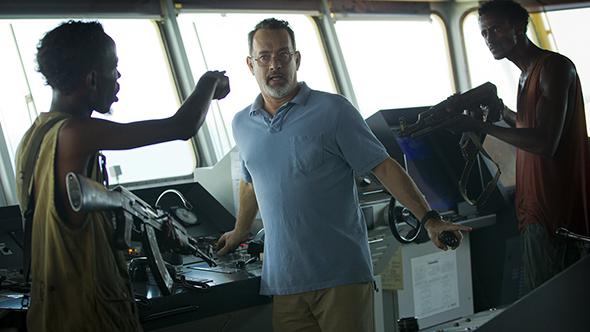Dear Dana and Mark (and Wesley in spirit),
OK, now that Movie Club has really heated up, I find myself engaging in my own Frenetic Random Activity Pattern. Border collie–style, we’ve gone ’round and ’round the rug on Her and Wolf of Wall Street. Where do we turn next? Oh look! Someone just threw a ball—and it’s called Concussion! I’m so glad that Dana and Wesley (and my dear former colleague, Andrew O’Hehir, who will be joining the Club on Thursday) sounded the alert on this one, because I missed it earlier and just watched it Tuesday night. Holy cow. I believe you used the appropriate technical term, Dana, in calling it “smokin’ hot.” But of course, there’s more to it than that. It’s a cool-hued miniature that uses tough, tiny brushstrokes to render many of the sneaky everyday horrors that can threaten even an essentially good marriage or union—the petty frustrations that blossom into big ones, the bargains that get struck and broken, the refusal to listen, or to talk, that becomes a de facto isolation booth. What Stacie Passon (along with Robin Weigert, in that gloriously stubborn performance) gives us isn’t particularly pretty: Intimacy comes with thorns attached. Yet the story draws us in rather than pushes us away.
I’m also glad Wesley mentioned Oscar Isaac in Inside Llewyn Davis: That’s one of my favorite performances of the year, and Dana, it’s interesting that you noted a parallel between Llewyn Davis and Weigert’s character in Concussion. Both actors have mastered the tricky business of seeming at once closed-off and open wide. These characters think they’re protecting themselves, but in reality they’ve exposed every nerve to the world. The second time I watched Llewyn Davis, I noticed—in a “How’d he do that?” moment—that Isaac had somehow visibly foreshortened his gaze, as if Llewyn had decided, bluntly, not to see anything or anyone standing even 1 millimeter outside his personal force field. That would be a great self-protection tactic, if only Llewyn weren’t absorbing the world through his skin—it’s going to get in, some way, somehow. Isaac’s performance is yet another entry in the “Why Actors Will Always Matter” log book, a reminder of how a character you don’t even like can break your heart.
But then a character who’s perfectly likable can slay you, too. That’s what I think Tom Hanks does in the last 10 minutes of Captain Phillips. Mark, I know you had the movie on your best-of-the-year list, and I’m hoping you’ll talk about it a little bit. While I think Hanks is pretty OK throughout Captain Phillips, what he does at the very end (spoiler alert!), after Phillips is rescued, is unlike anything I’ve seen from an actor before. After his ordeal, Phillips is led, dazed, to the infirmary on the Navy ship that’s picked him up. The technician hustles him onto a table and begins poking and prodding and asking routine questions. She notes the single small cut on his head but can’t help seeing that his chest is splattered with blood. Did all of that blood come from just the one cut? she asks. He responds as if he’s been shaken out of a nightmare: “That’s not mine!” he says, in a voice, both faraway and immediate, that isn’t his own, either—who am I, where have I been, and why is part of someone else’s life clinging to my skin? I pick on Hanks as an actor a lot—his desperate need to be liked drives me nuts—but he sheds all self-consciousness here, and he’s remarkable.
I also want to talk about Gravity, and, specifically, about how all that so-called bad dialogue actually serves the movie, but that will have to wait. Dana, you asked each of us to make a case for one overlooked movie, and mine would be the alien-invasion/fear-of-foreclosure drama Dark Skies, from writer-director Scott Stewart. Keri Russell and Josh Hamilton play a couple living, with their two kids, in a really nice house in the suburbs. Everything ought to be just peachy—except Hamilton, an architect, has been out of work for too long, and Russell, a real-estate agent, is feeling the strain of carrying the family’s financial load. Then aliens come—that’s not even the scary part. Dark Skies is in the same vein as the quasi-political horror pictures we used to get in the 1970s and ’80s, things like Joseph Ruben’s dream-family nightmare The Stepfather. Come to think of it, Dark Skies would make a good double bill with Concussion. It takes work to have a good life and a good marriage, but even if you do everything right, stress and anxiety will find you. “In every dream home a heartache,” as Bryan Ferry once sang. You may as well put out milk and cookies for the aliens.
But wait! Let’s not drive this conversation into despair. The Oscar nominations happen Thursday morning, and I’m really hoping the Academy comes out for Oprah Winfrey’s take-no-prisoners supporting performance in The Butler, a very old-school picture that covers some 50 years of civil rights movement history in a remarkably agile way. (I refuse to call it Lee Daniels’ The Butler, because that’s just dumb.) Oprah’s performance is the opposite of subtle. I just cannot forget that moment when, seething with resentment that her butler-husband, Forest Whitaker, hasn’t managed to wangle an invitation for her to visit the JFK White House, she rises from the couple’s marital bed, goes to the mirror, and—in a moment of feral femininity—meticulously applies a coat of lipstick. In that moment, she’s twice the woman that Cate Blanchett’s faux-bois Blanche du Bois in Blue Jasmine could ever be. They’d be nominated in different categories, of course. But I’m still on Team Oprah.
Yours,
Stephanie
